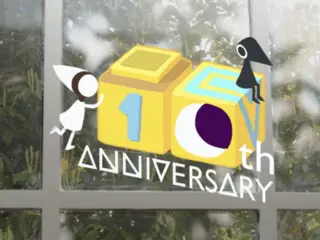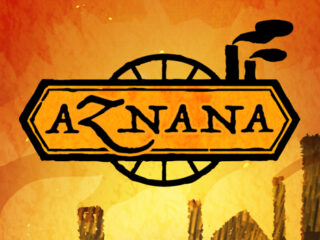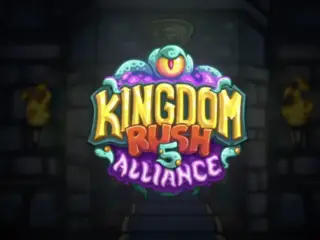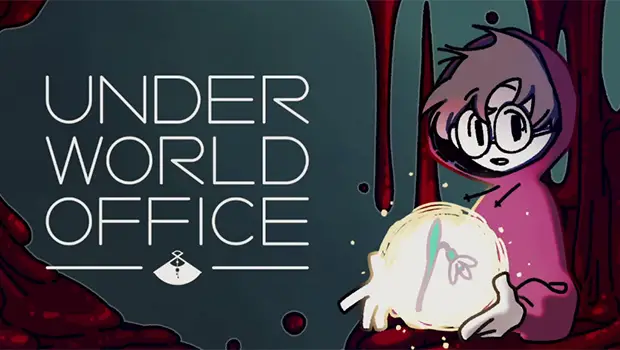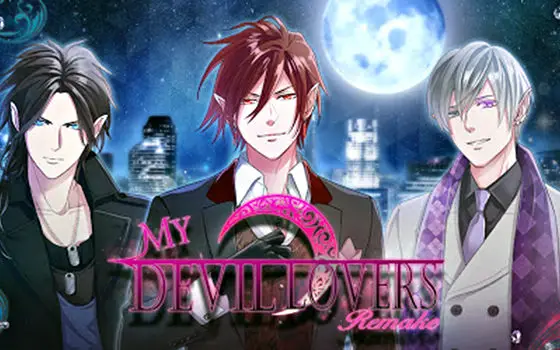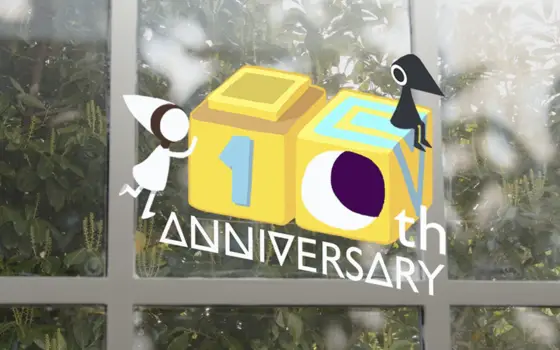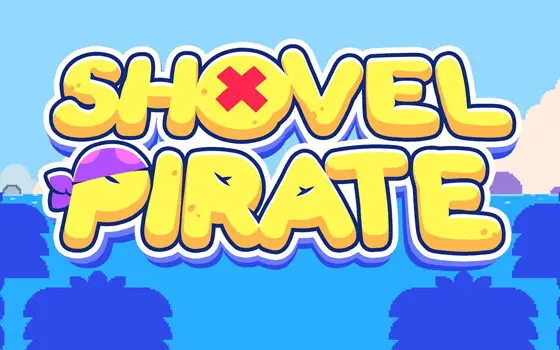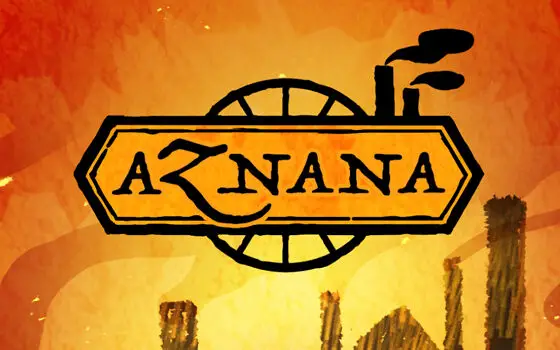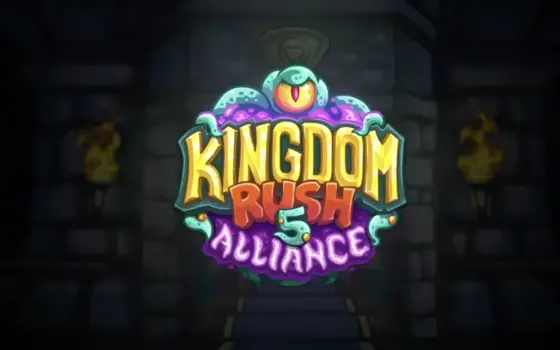To Hades With Accurate Descriptions
Described on the Google Play store as a mystery visual novel and adventure game, Buff Studio’s Underworld Office lives up to those designations in an “almost, but not quite” kind of way. Upon launch, the game seems promising. The art style isn’t unpleasant, the premise and setting are interesting, and the story is indeed presented in a visual novel style. However, the game presents no mystery, and I wouldn’t categorize it as an adventure either. I guess one out of three isn’t bad?
When Are They Gehenna Explain Things?
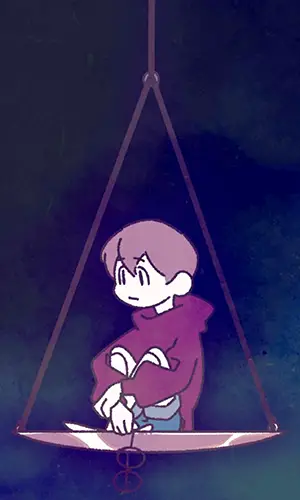 In Underworld Office, you embody Eugene, an endearing shy kid with a stutter and low self-esteem. He sits quietly in class, withdrawn into his orange hoodie and mostly ignored by his classmates. You feel for the kid and wonder what in his life has caused such a degree of self-effacement. Is he bashful because he stammers, or does he stammer because he’s bashful? Lo, the reason for his timidity is never revealed. And this is regrettable because a bit of exploration in this direction would have filled gaps in Eugene’s piecemeal character development.
In Underworld Office, you embody Eugene, an endearing shy kid with a stutter and low self-esteem. He sits quietly in class, withdrawn into his orange hoodie and mostly ignored by his classmates. You feel for the kid and wonder what in his life has caused such a degree of self-effacement. Is he bashful because he stammers, or does he stammer because he’s bashful? Lo, the reason for his timidity is never revealed. And this is regrettable because a bit of exploration in this direction would have filled gaps in Eugene’s piecemeal character development.
Nevertheless, you follow Eugene one day as he accidentally stumbles into the shady underworld of ghosts and monsters. One of the entrances to this spectral plane of existence is inexplicably a grate at the subway station. Upon entering the underworld, Eugene’s spirit exits his body, which then lies unprotected on the ground and promptly attracts a horde of hungry monsters. Luckily, a kind squad of ghosts rescues Eugene’s body and ushers the bewildered boy’s spirit into the Underworld Office.
Here again is an area where the story could have benefited from a bit more exposition. While we learn a little about how the underworld functions and how ghosts transform into monsters through repeated misdeeds, not much else is explained. We’re introduced to the group of engaging spirits who work in the Underworld Office, but never discover who they are, how they died, or why they work there. We also never learn more about the frightening monsters that populate the underworld and apparently threaten humanity on a regular basis. Perhaps Buff Studio intends to release sequels to this story and will reveal more at a later date?
I Can’t Pun All the Ways to Say Underworld
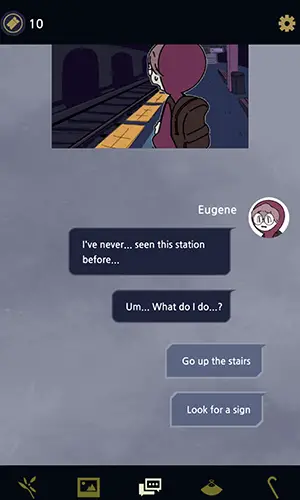 The presentation of Underworld Office is unique in that the game plays out as if you were reading a text message conversation on your phone. Eugene’s dialog is on the right side, while the other characters’ texts appear on the left. Occasionally, illustrative images accompany the dialog and scroll up and off the screen as part of the text convo. At other times, a short animation plays on top of the dialog. These usually serve to illustrate more dramatic or notable events in the story. Overall, I found this an engaging and fun way to present the narrative of Underworld Office.
The presentation of Underworld Office is unique in that the game plays out as if you were reading a text message conversation on your phone. Eugene’s dialog is on the right side, while the other characters’ texts appear on the left. Occasionally, illustrative images accompany the dialog and scroll up and off the screen as part of the text convo. At other times, a short animation plays on top of the dialog. These usually serve to illustrate more dramatic or notable events in the story. Overall, I found this an engaging and fun way to present the narrative of Underworld Office.
Frequently, as the story unfolds, two dialog options appear on Eugene’s side of the screen. You get to choose how Eugene will respond, and these decisions have an impact on the way the story unfolds. There are apparently seven different routes through Underworld Office, lending the game some replayability. As you progress through the game, following the different routes, you will unlock titles and illustrations. These serve no real purpose that I could discern other than perhaps appealing to gamers who are collection completionists. However, I didn’t find Underworld Office’s story compelling enough to spur a replay, let alone an urge to collect everything.
The Monetization Isn’t Abysmal
 Throughout most of the game, conversations between Eugene and the other characters unfold without your participation. Occasionally, you influence the story’s direction by choosing what Eugene will say next. When presented with a dialog choice for Eugene, it costs five tickets to make your selection. The game provides numerous ways to acquire these. Watching an ad scores you 40 tickets, or you can purchase tickets for real cash. I estimate that completing the game required me to watch approximately 20 ads. Not bad.
Throughout most of the game, conversations between Eugene and the other characters unfold without your participation. Occasionally, you influence the story’s direction by choosing what Eugene will say next. When presented with a dialog choice for Eugene, it costs five tickets to make your selection. The game provides numerous ways to acquire these. Watching an ad scores you 40 tickets, or you can purchase tickets for real cash. I estimate that completing the game required me to watch approximately 20 ads. Not bad.
There’s also an option called “I need more tickets.” This opens a third-party app that rewards tickets in exchange for completing various offers. For example, downloading another game might get you 20,000 tickets, or installing a survey app might earn 1200 tickets. This option for obtaining tickets seemed unnecessary. Watching ads is easier than doing tasks through a secondary app, and you will never use thousands of tickets.
Besides watching ads for tickets, the game also randomly interrupts your gameplay to run ads. Some are full length and run for 30 seconds; others can be closed as soon as they begin. An unobtrusive static ad banner also sits at the bottom of the screen throughout the game. I found this a thoughtful and acceptable way for the developers to earn ad revenue, and preferable to in-your-face monetization schemes that many mobile games use.
A search for Underworld Office on the Google Play Store reveals two versions of the game. The one that I played is free; the other variant costs a few bucks (currently $6.99). Although I’m just assuming that this solely eliminates the need to watch ads for tickets, I find it overpriced. The game can be finished in a few sessions and, like I said, I got through it by watching a couple dozen ads.
Oh, the Infernally Slow Pacing
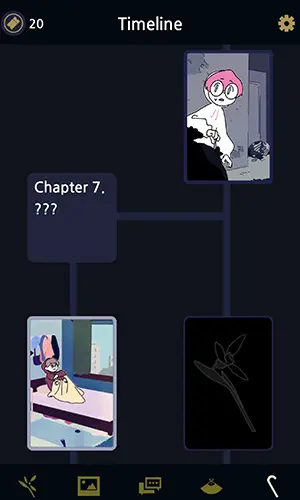 As for the game itself—the story, content, and gameplay—I generally found Underworld Office underwhelming. My primary reason for this is the extremely slow pace at which the story unfolds. I even said out loud once, “Get on with it!” It just drags out situations that could be resolved in a more concise and tidy manner. The conversations would often drone on and on for no reason that I could see other than poor planning or padding the gameplay.
As for the game itself—the story, content, and gameplay—I generally found Underworld Office underwhelming. My primary reason for this is the extremely slow pace at which the story unfolds. I even said out loud once, “Get on with it!” It just drags out situations that could be resolved in a more concise and tidy manner. The conversations would often drone on and on for no reason that I could see other than poor planning or padding the gameplay.
Also, the game has been translated from Korean…and it shows. Phrasing was very often awkward and even at times a bit nonsensical. Ellipses were tossed in all over the place for no clear purpose. The poor localization and unusual punctuation made what was already sometimes a difficult read even more snore inducing.
But my biggest gripe with Underworld Office is the constant feeling of anticlimax. It seems like something exciting and interesting is going to happen at any moment…but it never does. Perhaps one or two of the seven chapters ended with a sense of resolution. But most of them left me feeling like I’d just gulped down a flat, lukewarm soda when I was expecting a cool, refreshing beverage. And the worst perpetrator is unfortunately the ending. Obviously I won’t spoil it (not that there’s much to spoil), but I finished the game with a tickle of disappointment. I expressed this sentiment with a vocalization that I can’t quite recall, but it was something along the lines of “huh” or “boo.”
And that sums up Underworld Office for me: a promising beginning, an intriguing presentation, a considerate lack of obtrusive ads, a decent art style, and a feeling of disappointment.
Is It Hardcore?
Hell no.
Underworld Office stands out from the crowd thanks to its distinctive presentation. But it unfortunately doesn’t live up to its promises, and this results in a slight feeling of dissatisfaction by the end of the game.




